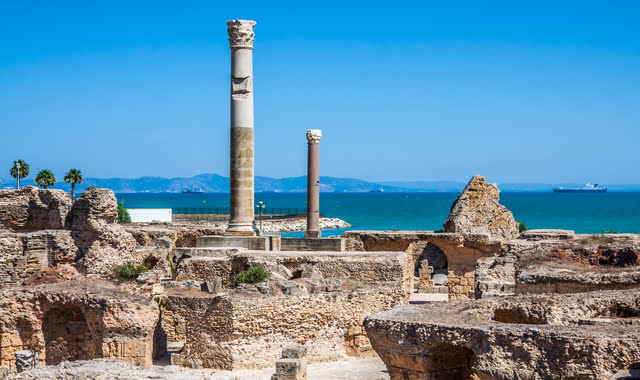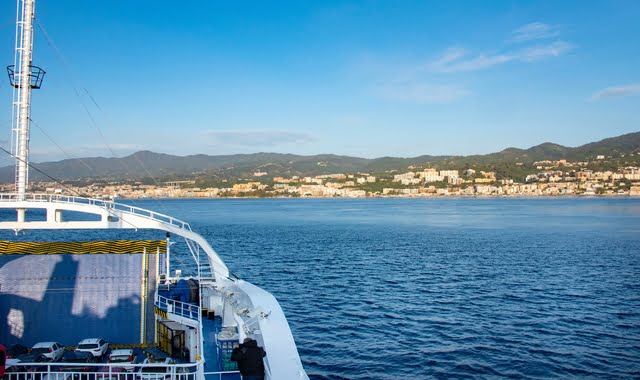Getting by car between Italy and Tunisia
Ferry routes and vehicle regulationsAre you organizing a trip between Italy and Tunisia by ferry and do you want to take your car on board? Find out from which ports you can depart, read more about the vehicle on-board regulations and road regulations in Italy and Tunisia.
Find all the information about it in our guide:
- Ferries Italy - Tunisia
- Ferry rates Italy - Tunisia with vehicles on board
- Documents required to travel between Italy and Tunisia
- Boarding procedures for motor vehicles on Italy - Tunisia ferries
- Driving in Tunisia
- Driving in Italy

The archaeological site of Carthage, on a hilly promontory overlooking the Gulf of Tunis
Ferries Italy - Tunisia: ports, companies and routes
Reaching Tunisia from Italy by sea is a very convenient solution for taking your vehicle on board and having greater flexibility with your luggage.
Even if the crossings are not very short, Italy - Tunisia ferries offer many services and guarantee maximum comfort on board.
Are you wondering where to take the ferry to Tunisia from Italy? Find out everything about ports, active connections, ferry operators, and Italy - Tunisia ferry ticket prices for 2024.
Italian ports connected with Tunisia
At the moment, there are 4 ports in Italy from which you can take the ferry to Tunisia: Genoa, Salerno, Rome (Civitavecchia) and Palermo in Sicily.
Ferries to Tunisia arrive at the “La Goulette” port of Tunis, one of the main ports in the country, located 11 km from the city center.
Useful info: Palermo is the closest Italian port to Tunis, and ferry crossings are therefore shorter.
Ferry companies operating the Italy - Tunisia routes
There are currently 3 ferry companies serving routes between Italian ports and Tunis: GNV (Grandi Navi Veloci), Grimaldi Lines and CTN.
The Italy - Tunisia ferry routes are all operated by conventional ferries traveling from a minimum of 10 hours up to a maximum of 27 hours. All ferries transport motor vehicles (including cars, motorbikes, campers and vans) and are equipped with many parking spaces.
For a more comfortable crossing, you can book a bed cabin (internal, external, suite or with access for disabled people), travel in a numbered seat, or choose a deck lounge seat.
On the Italy - Tunisia ferries you can also enjoy the restaurant service, the on-board entertainment (cinema rooms, shops, play areas and Wi-Fi connection), and even travel with your pet.
Ferry routes Italy - Tunisia 2024
Ferries between Italy and Tunisia operate all year round with mostly night crossings. Read more about the 2024 routes and decide where to start your journey:
- From Palermo to Tunis: the Palermo - Tunis ferry is the fastest to reach Tunisia from Italy. There are usually 4 crossings per week and the crossings vary between 10 and 14 hours.
- From Civitavecchia to Tunis: Civitavecchia - Tunis ferries run twice a week with crossings between 17 and 27 hours depending on the type of ferry and trip chosen.
- From Genoa to Tunis: the Genoa - Tunis ferry operates 2-3 times a week with crossings between 17 and 27 hours.
- From Salerno to Tunis: the Salerno - Tunis ferry is active 2 times a week and the fastest connection lasts 22 hours.
Useful info: find out more about the Italy ferry schedules for 2024 in our dedicated blog!

The Monte Pellegrino mountain overlooking the port of Palermo, Sicily
How much is a car ticket on the Italy - Tunisia ferry?
Generally, the price of car tickets on Italy - Tunisia ferries varies between €30 and €70. Rates depend on various factors, such as the duration of the trip, the size of the vehicle and the period in which you are traveling. Also, the type of seat you choose can affect the total ticket price.
Usually, ferry companies offer special rates for early bookings or if you travel on certain days of the week. Very often there are also ferry deals on camper tickets.
Since places for vehicles on board are limited, we suggest planning your Italy - Tunisia trip in advance. See all 2024 ferry offers for Italy and save on tickets!

Cars ready to disembark in an Italian port
What documents are required for traveling between Italy and Tunisia?
To travel between Italy and Tunisia, apart from your passport, you must bring all your car documents with you.
Required documents to enter Tunisia from Italy
To enter Tunisia from Italy travelers must have a passport with at least 3 months of remaining validity. Remember to check the expiration date of your passport in advance and renew it if necessary.
Only in exceptional cases (for example, if you are traveling on organized tours), you may be allowed to enter Tunisia using an EU identity card.
If you are an EU citizen visiting Tunisia for a period of less than 90 days, you won’t need an entry visa. If your stay exceeds this limit, you’ll need to apply for a residence permit through the local Police Headquarters. The same rule applies to U.S. passport holders and British citizens.
Note that before arriving in Tunisia, the ferry’s staff will provide passengers with a form to fill out, certifying the purpose of entry as tourism.
If you are a foreign national residing in Italy and plan to visit Tunisia, a valid passport is the only accepted document. Whether or not you require a Tunisian entry visa depends on your nationality, so it's advisable to contact the Tunisian Consulate for more information.
Required documents to enter Italy from Tunisia
The required documents for entering Italy from Tunisia depend on the traveler's country of origin:
The Italian citizens returning to Italy only need a valid passport.
If you are a permanent resident in Tunisia and wish to visit Italy for tourism (a stay of less than 90 days), you will require an entry visa and potentially other documentation mandated by the Italian Foreign Ministry (Farnesina).
Tunisian citizens with regular residency in Italy do not need a visa to enter Italy from Tunisia. They can travel using your passport and a valid residence permit.
Additional info: you can visit the official Farnesina website to determine the necessary forms and documents to enter Italy from your country.
Documents for carrying a vehicle on ferries between Italy and Tunisia
In order to travel by ferry between Italy and Tunisia, you must bring the following documents:
- National driver's license
- Vehicle registration document (with a possible declaration if the vehicle is not in the driver's name)
- Car insurance
- Carta Verde (Green Card), issued by your insurance company for Italian vehicles traveling in Tunisia
Tip: bring a spare key for your vehicle in case of emergencies!

Car boarding a ferry departing from Italy to Tunis
Are there specific procedures for boarding vehicles on a ferry?
Yes, when it comes to boarding vehicles on a ferry, there are some procedures you should be aware of. Generally, ferry companies require passengers to arrive at the port well in advance. For Italy - Tunisia ferries, it's recommended to be at the port at least 3 hours before departure.
Upon arrival, after ticket and document checks, drivers need to follow the instructions of the port staff and park their vehicles at the assigned location. If you're traveling with other passengers, they’ll have to disembark and board on foot.
During the ferry crossing, access to the garage and the vehicle is not permitted. Therefore, passengers should bring all the necessary luggage trying not to leave anything important in the vehicle.
If you own an LPG car, you should declare it when you book your tickets and also notify the staff before boarding. LPG vehicles on ferries are usually parked in designated spaces and may be required to travel with a partially empty fuel tank.
What happens once my vehicle disembarks in Tunisia or Italy?
Upon disembarking from the ferry in Tunisia or Italy, specific control procedures are implemented:
- Vehicles and passengers undergo customs checks, which may include inspections of the vehicle to ensure there are no prohibited or dutiable goods or objects.
- All passengers are required to present the necessary travel documents to verify their eligibility to enter the country with their vehicle.
- For foreign vehicles disembarking at the Tunis port, a certificate is issued upon arrival, confirming the vehicle's registration in the territory and authorization for circulation, complete with entry and expiry dates (usually valid for up to 3 months). Keep in mind that the Tunisian government imposes a tax of 30 dinars (approximately €9) for each motor vehicle entering Tunisia.
Important: when leaving Tunisia, you must exit the country with the same vehicle you entered with. In unfortunate events such as theft or other circumstances, customs authorities may impose a heavy fine before granting authorization to leave the country.

Car queues at the customs control of the port of Tunis
Useful info for driving in Tunisia
Here's some info you should know if you're planning to hit the road in Tunisia:
Tunisia boasts a pretty extensive road network, which makes it pretty easy to get around. Just like in most EU countries, in Tunisia, they drive on the right side of the road.
Road signs are similar to what you'd find in Europe, and they're usually in Arabic and French. When it comes to speed limits, it's best to stick to around 50 km/h in cities, while on the highways, you can cruise at up to 110 km/h. Good news for road trippers: there are plenty of gas stations around, and fuel is pretty cheap.
Always remember to drive cautiously and keep an eye out for any animals unexpectedly shown on the road, especially in rural areas.
If you're planning a road trip to Tunisia, avoid venturing into certain parts of the country, especially near the borders with Libya and Algeria. Safety first, right? For more deets on staying safe in Tunisia, you can reach out to the Tunisian tourism offices of your country.
Useful info for driving in Italy
Just like in other countries, the Italian Highway Code has its own set of must-haves and rules to ensure people drive around safely.
For all the nitty-gritty details and tips on driving in Italy, the official Ministry of Tourism online guide is your go-to! And if you're planning to explore the beautiful Italian islands by car, don't forget to check out all the restrictions on vehicle disembarkation and circulation in Italy.
Important: If you're traveling from abroad and your car has a foreign license plate, you've got a 3-month window to drive around Italy. After the deadline, your vehicle must be re-registered with an Italian license plate or transferred back to your country.

A splendid overview of the Italian city of Genoa and its port
Book your Italy - Tunisia ferry online and travel with your vehicle
On Ferryhopper you can book your Italy - Tunisia ferry trip for you and your vehicle at the best price and with no hidden fees!
Choose the trip you like best on our Map of ferries and proceed with your booking. Simply select the number of passengers and add the type of vehicle you want to board. Seas the day and book your ferry tickets with ease!
Important: remember to provide accurate information, including the vehicle's model and license plate, as you'll be required to present your registration documents before boarding the ferry.
